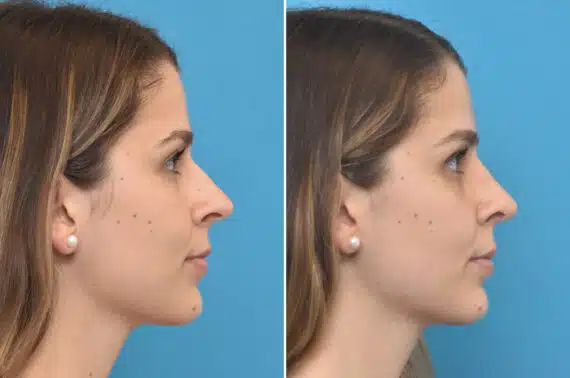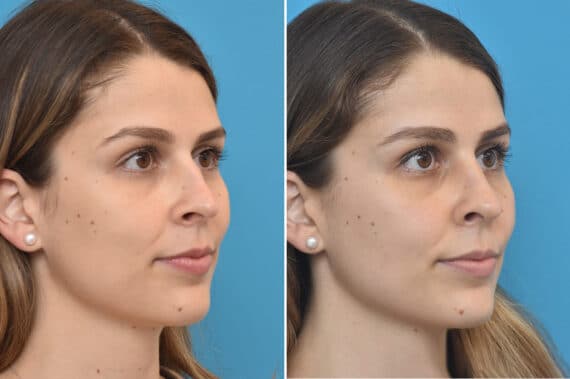Ever wondered why some people notice black eyes after rhinoplasty? A nose job transforms the face, but the healing journey can include swelling and color changes that raise alarm. Understanding what is normal, what helps, and what to expect keeps you calm and confident, not worried about excessive bruising either.
Stay with us as we break down what causes black-and-blue marks, how long they linger, and smart ways to heal faster. With clear explanations and practical steps, you will know when to reassure yourself and when to call your surgeon so your results stay the focus, not temporary bruising alone.

Why Do You Get Black Eyes After Nose Surgery?
Black eyes happen because rhinoplasty bruising from tiny blood vessels can track by gravity into the eye area. During surgery, tissue is lifted and shaped; with some rhinoplasty techniques, this creates leakage that settles below thinner eyelid skin. That pooled blood causes post-operative bruising and the familiar purple or green shades. As the body clears pigments, you see discoloration of undersurface skin fade week by week. Cold compresses, head elevation, and avoiding pressure help limit spread, while severe, worsening pain or vision changes deserve a prompt call to your surgeon.
How Long Do Black Eyes Last After Rhinoplasty Surgery?
Most post-surgical bruising begins to fade within 7 to 10 days after surgery, with swelling reducing at the same pace. While the darkest discoloration softens during the first week, mild residual bruising can linger another week or two, depending on skin type and healing habits. Full recovery of skin tone around the eyes usually happens by the one-month mark, though healthy habits and surgeon-approved care can speed that process.
Can You Get Permanent Black Eyes After Rhinoplasty Recovery?
Permanent discoloration from black eyes after rhinoplasty is extremely rare, but it can happen. Most rhinoplasty patients notice that even severe bruising fades completely as the body clears trapped pigment and heals tissue. In unusual cases where bruising lingers longer than expected, it is typically due to swelling, thin skin, or minor complications—not true permanent staining. If any discoloration persists beyond several weeks, your rhinoplasty surgeon can evaluate and recommend treatments to restore even tone.
Rhinoplasty Patient Results


* All patients are unique and individual results may vary.
Tips to Lower the Risk of Swelling and Bruising After Rhinoplasty?
Proper post-operative care plays a major role in how smoothly bruising and swelling resolve. Even though some discoloration is inevitable, simple daily habits can make a big difference in your rhinoplasty results. By following your surgeon’s instructions and supporting your body’s healing process, you set yourself up for a more comfortable, speedy recovery.
Apply cold compresses
Cold compresses help constrict blood vessels beneath the facial skin, slowing the spread of discoloration and easing discomfort. Apply chilled pads or wrapped ice packs gently around the eyes—not directly on the nose—for 10 to 15 minutes at a time during the first few days. Consistent cooling reduces swelling and limits the severity of bruising.
Avoid pressure on your nose
Keeping weight and movement away from the nasal area helps prevent shifting or irritation of healing tissue. Avoid resting glasses on the bridge of your nose, sleeping facedown, or bumping your face during daily activities. Even light pressure can worsen swelling and prolong the presence of bruising around the eyes.
Do not blow your nose
Blowing your nose too soon can force pressure through healing nasal passages, risking bleeding and pushing fluid into nearby tissue. Instead, gently dab or use saline sprays if approved by your surgeon to keep the area clean without strain. Protecting internal stitches helps bruises fade faster and keeps recovery on track.
Take medications as directed
Always follow your surgeon’s prescription timing and dosage, and avoid blood-thinning medications unless specifically approved. Pain relievers like aspirin or certain supplements may worsen bleeding beneath the skin, leading to more visible bruising. Taking only approved medications keeps circulation stable and supports faster healing.
Respect Your Healing Process
Healing is not a race, and giving your body time to adjust is essential for a smooth recovery. Make sure you get enough rest to allow tissue to repair itself properly. Stay hydrated and focus on a healthy diet rich in vitamins and proteins that support skin regeneration. Most importantly, avoid strenuous activity that could elevate blood pressure or disrupt delicate healing sites. Listening to your body and pacing your routine ensures swelling fades naturally and bruises clear without setbacks.
How to Get Rid of Dark Circles After a Nose Job
Even after swelling fades, light shadows or dark tones may linger beneath the eyes. Fortunately, a range of cosmetic procedures can brighten the area and restore a refreshed look. From topical options to minimally invasive treatments, the right approach depends on skin type, severity, and your surgeon’s guidance.
Topical Creams
Topical creams are often the first line of defense for mild discoloration because they work gradually to improve skin tone without downtime. Ingredients like vitamin C, retinol, and caffeine help boost circulation and fade lingering pigmentation beneath the eyes. When applied consistently and paired with sun protection, these formulas can greatly enhance brightness and support overall healing.
Laser Therapy
Laser therapy targets pigmentation beneath the skin by breaking down darker patches so they can be absorbed naturally by the body. It works well for patients whose discoloration is more stubborn or caused by lingering inflammation. Treatments are quick and minimally invasive, offering noticeable improvement in tone after just a few sessions.
Chemical peels
Chemical peels exfoliate the upper layers of skin to reveal fresher, more evenly toned tissue beneath. Light to medium-strength peels can soften pigmentation and improve texture under the eyes without significant downtime. When performed by a professional, they stimulate collagen production and complement other treatments for longer-lasting brightness.
Injectable filler
Injectable filler helps smooth dark circles by restoring volume beneath hollow areas that cast shadows. When bruising has healed but the under-eye region still looks sunken, strategic placement can blend the lower eyelid into the cheek for a softer transition. Results appear instantly and last several months when performed by a skilled provider.
Blepharoplasty
Blepharoplasty is a surgical procedure designed to remove excess skin or fat from the eyelids, making it ideal for patients whose dark circles are caused by sagging tissue rather than pigmentation alone. By tightening and smoothing the under-eye area it reduces shadowing and brightens the overall appearance. For some, it offers longer-lasting improvement than topical treatments.
Fat Grafting
Fat grafting uses your own purified fat to fill hollow areas beneath the eyes and improve overall tone. Surgeons carefully harvest a small amount of fat from another body area, process it, and inject it into targeted regions to restore volume naturally. Because the material is your own, results feel soft and blend seamlessly with surrounding tissue.
Our surgeons will guide you every step of the way.
Your best results start with the right recovery. Contact Becker Plastic Surgery.
Schedule a Rhinoplasty Consultation Today
Selecting a highly experienced facial plastic surgeon is the smartest way to protect your results and recovery. Training in facial plastic surgery, meticulous planning, and modern surgical techniques helps minimize bruising, swelling, and downtime while improving predictability. An experienced, qualified plastic surgeon also guides you on prevention and aftercare so healing feels clear and manageable.
At Becker Plastic Surgery in New Jersey and Philadelphia, your rhinoplasty procedure is performed by an expert team known for advanced ENT and facial credentials, precision technique, and natural results. Ready to take the next step? Start your rhinoplasty consultation today. Visit our contact page to schedule a consultation or go to our locations page to check for the phone number in your city.